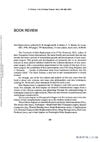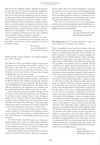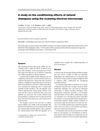 11 citations,
January 2004 in “Exogenous dermatology”
11 citations,
January 2004 in “Exogenous dermatology” Outside factors like grooming, chemicals, and the environment can damage hair and cause disorders.
7 citations,
January 2020 in “Skin Appendage Disorders” Take care of your hair as much as your face for a youthful look.
 2 citations,
March 2005 in “International Journal of Cosmetic Science”
2 citations,
March 2005 in “International Journal of Cosmetic Science” Human hair structure varies by ethnicity, and certain treatments can improve hair condition and appearance.

New methods to classify curly hair types were developed based on shape and strength.
 July 2011 in “Springer eBooks”
July 2011 in “Springer eBooks” The document concluded that FDA-approved treatments like minoxidil and finasteride are effective for hair loss, while the effectiveness of natural remedies and other non-approved treatments is not well-supported by evidence.
 January 1997 in “Journal of Toxicology-cutaneous and Ocular Toxicology”
January 1997 in “Journal of Toxicology-cutaneous and Ocular Toxicology” The book "Hair Replacement" is a detailed guide on hair transplant and treatments, useful for surgeons and clinicians.
 July 1996 in “International Journal of Dermatology”
July 1996 in “International Journal of Dermatology” The book "Hair Replacement" is a detailed guide on all methods of hair replacement, recommended for those interested in the field.

The book is a detailed guide on hair growth issues and treatments, recommended for specialists and hospital libraries.

Hair product allergies are common, especially to hair dyes, and hairdressers are at higher risk.

Male pattern baldness is a common hair loss in men caused by genetics and hormones, with treatments including drugs, hair transplants, and hair loss products.
 2 citations,
January 2015 in “Elsevier eBooks”
2 citations,
January 2015 in “Elsevier eBooks” The document says biodegradable cosmetics and packaging are better for the environment and user experience.

The polyherbal hair mask is a safe and effective alternative for improving hair health.
 November 2023 in “International Research Journal of Modernization in Engineering Technology and Science”
November 2023 in “International Research Journal of Modernization in Engineering Technology and Science” Herbal shampoos clean and improve hair naturally without harmful side effects.
 4 citations,
October 2018
4 citations,
October 2018 Hair loss in children is often caused by scalp infections, immune disorders, hair pulling, stress, and requires careful treatment due to emotional effects.
 September 1998 in “JEADV. Journal of the European Academy of Dermatology and Venereology/Journal of the European Academy of Dermatology and Venereology”
September 1998 in “JEADV. Journal of the European Academy of Dermatology and Venereology/Journal of the European Academy of Dermatology and Venereology” The document concludes that individualized treatments for hair issues are effective, certain hair changes can indicate neurocutaneous diseases, specific lotions improve skin health, laser hair removal works but needs more study on long-term effects, men's cosmetics are diverse, peeling is effective but can have side effects, and facial pigmentation is often due to overactive skin cells.
 January 2024 in “Deleted Journal”
January 2024 in “Deleted Journal” Essential oils may help hair health but lack strong scientific proof and can cause allergic reactions.
 17 citations,
July 2018 in “International Journal of Cosmetic Science”
17 citations,
July 2018 in “International Journal of Cosmetic Science” Keratin-based particles safely improve hair strength, smoothness, and heat protection.
 6 citations,
January 2016 in “Annals of Dermatology”
6 citations,
January 2016 in “Annals of Dermatology” Human hair contains more glycosaminoglycans in children than adults, and these compounds decrease with age, possibly affecting hair thickness.
 5 citations,
July 2006 in “Contact dermatitis”
5 citations,
July 2006 in “Contact dermatitis” Ammonium bisulfite in hair bleach can cause facial eczema.
 1 citations,
December 2019 in “International journal of innovative technology and exploring engineering”
1 citations,
December 2019 in “International journal of innovative technology and exploring engineering” Fish scale-based organic hair oil and shampoo may improve hair health and prevent damage.
 December 2024 in “Journal of Population Therapeutics and Clinical Pharmacology”
December 2024 in “Journal of Population Therapeutics and Clinical Pharmacology” Rosemary and kalonji seeds can improve hair health and treat hair conditions.
 September 2014 in “Hair transplant forum international”
September 2014 in “Hair transplant forum international” Caffeine, niacinamide, and panthenol may improve hair growth, fullness, and healing when applied to the scalp.
 14 citations,
January 2016 in “Elsevier eBooks”
14 citations,
January 2016 in “Elsevier eBooks” Liposomes improve the delivery and effectiveness of cosmetic ingredients but face challenges like cost and stability.
 5 citations,
January 2017 in “Journal of Nanomedicine & Nanotechnology”
5 citations,
January 2017 in “Journal of Nanomedicine & Nanotechnology” Nanoemulgel could be a promising new treatment for hair loss.
 22 citations,
February 2002 in “Clinics in Geriatric Medicine”
22 citations,
February 2002 in “Clinics in Geriatric Medicine” Many elderly women experience unwanted facial hair and various hair loss conditions, with treatments available for each condition.
 10 citations,
June 2001 in “International Journal of Cosmetic Science”
10 citations,
June 2001 in “International Journal of Cosmetic Science” Natural shampoos made in the lab conditioned hair better than commercial ones with chemicals.
 8 citations,
October 2019 in “International Journal of Dermatology”
8 citations,
October 2019 in “International Journal of Dermatology” The study concluded that combination therapy with topical corticosteroids and hydroxychloroquine or finasteride is effective in treating Frontal fibrosing alopecia in Asians.
 4 citations,
January 2015 in “Endocrinology & metabolic syndrome”
4 citations,
January 2015 in “Endocrinology & metabolic syndrome” Testosterone can cause acne and male-pattern baldness, affects hair growth in men and women, and makes male skin more sensitive.
 1 citations,
March 2005 in “International Journal of Cosmetic Science”
1 citations,
March 2005 in “International Journal of Cosmetic Science” Twisting hair weakens it, but strength can be recovered at low twist levels.
 February 2004 in “The New England Journal of Medicine”
February 2004 in “The New England Journal of Medicine” The book is a comprehensive resource on hair disorders, but lacks information on some conditions.





























